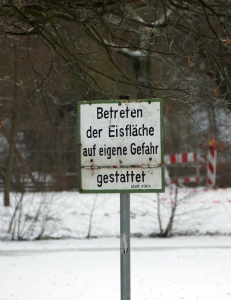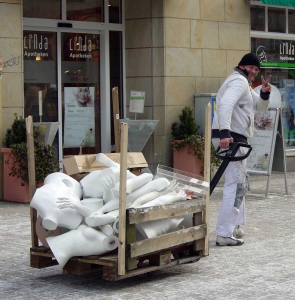Deutschlandfunk Presseschau Deutschland und international, Samstag, 18. Februar 2012 12:50 Uhr
About twice a week, when I’m driving to appointments, I hear the Deutschlandfunk station reporting on the press. I’m going to quote it below, but today’s text won’t be there forever, although there is an archive online for the week.
You can find the latest summary of what the newspapers say on Deutschlandradio at www.dradio.de/presseschau.
What fascinates me is the way they vary the reporting verbs. It’s good that they name the newspaper both before and after the quote, but I find myself listening to the verbs they use almost more than to the opinions. I’ve bolded what I mean below. They must have a collection of verbs at hand.
(The omissions below were not made with any political intent – I just didn’t want to quote the whole thing, for copyright reasons).
Auch international beschäftigt der Rücktritt von Bundespräsident Wulff die Kommentatoren. Die dänische Zeitung BERLINGSKE TIDENDE schreibt dazu:
“Der deutsche Bundespräsident soll sauberer als alle anderen sein – so sieht es die Tradition vor. …Der Rücktritt ist daher richtig”,
findet BERLINGSKE TIDENDE aus Kopenhagen.
Die ungarische Zeitung NEPSZABADSAG sieht es ähnlich:
“Wulff betont zwar beständig seine Unschuld….”,
argumentiert NEPSZABADSAG aus Budapest.
Die polnische Zeitung RZECZPOSPOLITA vergleicht die Situation mit anderen Ländern:
“Wenn die Staatsoberhäupter anderer Staaten unseres Kontinents ein ähnlich empfindliches Gefühl dafür hätten, …An einige polnische Politiker darf man da schon gar nicht erst denken”,
unterstreicht die RZECZPOSPOLITA aus Warschau.
Die italienische Zeitung LA STAMPA beleuchtet die Auswirkungen des Rücktritts auf Europa:
“Während die Spekulationen über den Nachfolger von Wulff voll entbrannt sind, stellt sich auch die Frage, welche Auswirkungen der Fall auf die Probleme in Europa und die Euro-Krise hat. …”
So weit LA STAMPA aus Turin.
Der österreichische STANDARD blickt auf die Rolle von Bundeskanzlerin Merkel:
“Bei allem Mitgefühl für die schwierige Situation des jüngsten und am kürzesten amtierenden Staatsoberhauptes Deutschlands -man hatte bei seinem Rücktritt nicht den Eindruck, dass er das Problem verstanden hat. … Wer nicht spurt, wird entsorgt, so funktioniert das im System Merkel”,
glaubt DER STANDARD aus Wien.
“Angela Merkel und ihre Koalition aus Christdemokraten und Liberalen haben die Funktion des Präsidenten für Machtspiele missbraucht”,
kritisiert die tschechische Zeitung DNES und fügt hinzu:
“Nun zeigt sich, …Sie muss auch im Interesse der Sache eine Persönlichkeit finden, zu der die Deutschen aufsehen können”,
urteilt DNES aus Prag.
Für die serbische Zeitung POLITIKA steht Kanzlerin Merkel nun politisch unter Druck:
“Kein Wunder, …Die Bundeskanzlerin kann es sich nicht leisten, dass ein dritter Rücktrittskandidat als Nachfolger erkoren wird”,
notiert POLITIKA aus Belgrad.
Die bulgarische Zeitung SEGA kommentiert das Angebot von Kanzlerin Merkel, zusammen mit der Opposition nach einem gemeinsamen Kandidaten zu suchen:
“Mit diesem ungewöhnlichen Schritt …”,
vermutet SNEG aus Sofia.
Die niederländische Zeitung NRC HANDELSBLAD führt aus:
“Kanzlerin Merkel will mit SPD und Grünen einen gemeinsamen Kandidaten finden. Hoffentlich hält sie Wort, a…”,
betont NRC HANDELSBLAD aus Amsterdam.
Die russische Zeitung KOMMERSANT geht auf die Rolle der Medien ein:
“Kanzlerin Angela Merkel dankte Christian Wulff für die geleistete Arbeit und fügte hinzu, dass sie den Rücktritt sehr bedauere….”,
ist im KOMMERSANT aus Moskau zu lesen.
Die NEUE ZÜRCHER ZEITUNG übt sich in Medienschelte:
“Hinter dem fast täglichen Theater um neue Enthüllungen, … Eigenartig, wie viele Augen da plötzlich blind sind”,
urteilt die NZZ aus der Schweiz.
Die türkische Zeitung SABAH meint:
“Wulffs Botschaft auf die Mailbox von ‘Bild’-Chef Kai Diekmann war der Beginn seines Sturzes. …dadurch wird die Demokratie noch stärker”,
ist SABAH aus Istanbul überzeugt, mit der die internationale Presseschau endet.













